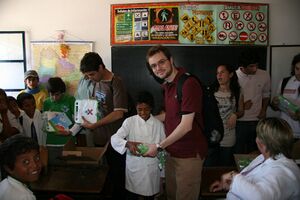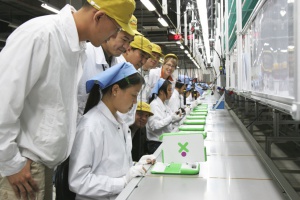The OLPC Wiki
| english | عربي | پښتو | български | deutsch | español | français | kreyòl ayisyen | italiano | 日本語 | 한국어 | монгол | Bahasa Melayu | नेपाली | norsk | português | română | русский | kinyarwanda | türkçe | 中文 | 繁體中文 | HowTo [ID# 81738] +/- |
Welcome to the OLPC Wiki, home to collaborative notes about the One Laptop per Child project and related projects and communities. We currently have 9,909 pages, and roughly two-thousand files and two-thousand registered contributors; please join us and share your ideas. There is also a non-wiki laptop.org.
What's new
- We've only just begun: Uruguay has started the first mass-production deployment of OLPC! (See Ivan Krstić's blog for more details [1].)
- The XO is now available through the Give One Get One program.
- Mass Production has started!
- T-Mobile USA Partners with One Laptop per Child To Help Children. (Free WiFi hotspot access to Give One Get One participants).
- Khairat Chronicle—a report from Mumbai (Wikinews gives the Khairat Chronicle lead article spot.)
- Build 623 is the new stable build (our first ship build). Please use this build (along with Firmware Q2D03). Note: neither Build 623 nor Firmware Q2D03 are suitable for B2-1 systems; for those systems, please continue to use Build 406.15. Please refer to the OLPC Ship.1 Software Release Notes.
- A brief tour of the laptop is found here.
- Curious about what software runs on the laptop? See the Activities Grid for an overview.
- Donate a laptop as part of our Give One Get One program. If you are interested in targeted group donations, e.g., you want to equip an entire school, please look into our Give Many program (i.e., Give 50-Get 100 or Give 250-Get 1000).
- We are in a testing phase as we approach mass production; your help and feedback would be appreciated (See Test issues).
- The XO Laptop won the 2007 Index Award in the community category.
- You can now add an OLPC badge to your website.
Weekly updates can be found in Current events.
About One Laptop per Child
- It's an education project, not a laptop project.
This is the wiki for the One Laptop per Child association. The mission of this non-profit association is to develop a low-cost laptop—the "$100 Laptop"—a technology that could revolutionize how we educate the world's children. Our goal is to provide children around the world with new opportunities to explore, experiment, and express themselves.
Why do children in developing nations need laptops? Laptops are both a window and a tool: a window into the world and a tool with which to think. They are a wonderful way for all children to learn learning through independent interaction and exploration.
OLPC espouses five core principles: (1) child ownership; (2) low ages; (3) saturation; (4) connection; and (5) free and open source.
More on the Laptop and OLPC's vision for learning.
Want to know more? Perhaps get involved?
A good place to start is the One Laptop per Child page, which gives an overview of the project. There is a list of frequently asked questions (FAQ); a place to ask a question; places to get involved, participate and current job openings; We can use some extra help translating and preparing content bundles in general, for example. There are numerous pages on hardware, software, content, and the developers program—and a separate wiki for software development. Sugar is a novel interface with its own interface guidelines. There are also discussion pages on issues of deployment and country-specific discussions. An extended table of contents is also available.
If you want to try out the laptop, it is not very difficult to emulate the XO on your PC. Better yet: you can support us by getting the real deal with Give 1 Get 1. The latest build is always available here. The latest stable build is always available here. (Please use 406.15 for B1 and B2 machines; please use 623 for B4 machines.)
OLPC is also carefully filling some full-time positions.
About this wiki
The purpose of this wiki is to both share information about the project and to solicit ideas and feedback. The articles and discussion vary from technical to epistemological. We invite comments on every page (please use the "discussion" tab at the top of each page). Please restrict edits to the article pages themselves to facts, not opinions. You are encouraged to sign your work and to make liberal use of citations and links. (Please make an account and please use ~~~~ as a signature for your comments.) Please note that pages that include the {{OLPC}} template—such as this one—are maintained by the OLPC team and are generally representative of the current state of the project. Other pages—created and maintained by the public—should be read with that in mind.



